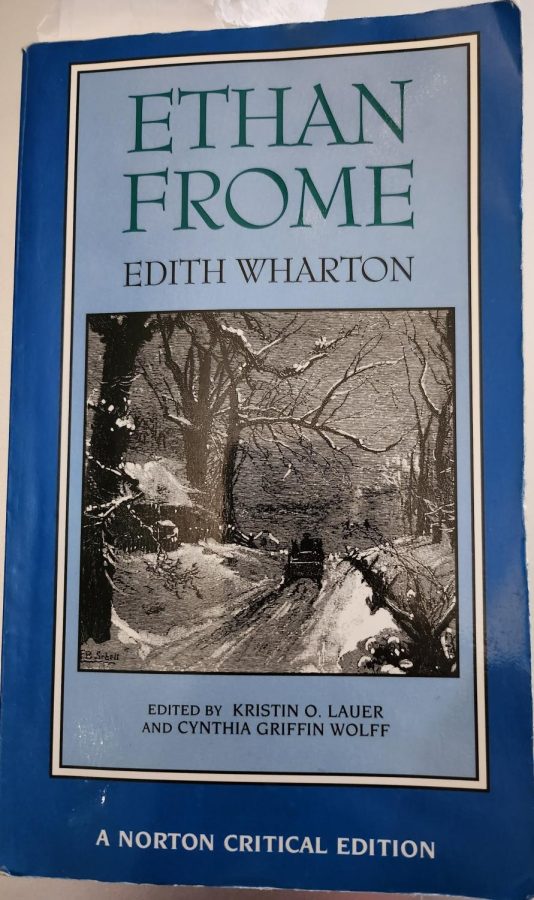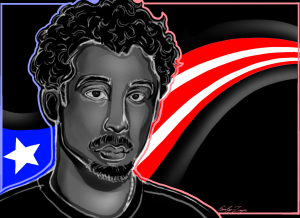The Intricacies of “Ethan Frome”
In her novel “Ethan Frome,” Edith Wharton crafts a work with realistic characters, a complex plot and hidden themes that make the short book a worthwhile read.
April 24, 2023
Most of the books students are forced to read for school are resented or forgotten, replaced in our minds by the next meme that pops up on our phones. However, after discussing the novel “Ethan Frome” by Edith Wharton in my English class at UIC in early February to late April of this year, this particular book earned a special place in my heart.
“Ethan Frome” starts off with the narrator, an engineer, seeing and growing curious about a 52-year-old man named Ethan Frome, who was physically disabled in an accident. Ethan is a resident of Starkfield, an isolated New England town where the narrator is stuck for the winter. The narrator asks the townspeople about Ethan, but everyone seems to tell a different story. Finally, during a blizzard, Ethan invites the narrator to spend the night at his house. At that point, the story switches to the narrator’s vision of the events 24 years ago that led up to Ethan becoming disabled. From then on, the majority of the story centers around young Ethan’s miserable marriage to Zeena and his infatuation with Zeena’s younger cousin, 21-year-old Mattie Silver, who is living with them.
I enjoyed the hidden complexity of the plot. As aforementioned, the entire middle of the story that takes place 24 years ago is actually the vision of the narrator. That’s easy to forget since this vision takes up 58 pages of the 74-page novel. However, the unique structure contributes to the dreamlike quality of the novel as a whole by making the reader uncertain whether the events of the vision truly happened as they were told. I enjoyed the implicit invitation to speculate about young Ethan Frome’s reality. Looking back on the novel after finishing it, I was eager to fill in the many gaps of the story Wharton left empty and reply to the questions she left unanswered.
I love how, throughout the novel, Wharton describes her characters with realistic detail. Wharton kicks off with this on the very first page as she justifies why the narrator views Ethan as the most striking figure in Starkfield: “It was the careless powerful look he had, in spite of the lameness checking each step like the jerk of a chain. There was something bleak and unapproachable in his face, and he was so stiffened and grizzled that I took him for an old man and was surprised to hear that he was not more than 52.” This characterization kept me engaged and made me wonder alongside the narrator what kind of “smash-up,” as the townspeople call it, caused Ethan’s disability.
What made “Ethan Frome” an impactful book for me to read are all the hidden themes within its pages despite its apparent simplicity at first glance. One of these themes is the transcendence of gender boundaries by Edith Wharton’s struggles being represented in her character, Ethan.
According to Edith Wharton’s website The Mount, a museum that was once the home of Wharton and her husband, she was born in 1862 when the only expectation for women was for them to marry. The New York Historical Society reveals Wharton’s marriage was unhappy, and she had an affair. Considering that “Ethan Frome” was published a year before Wharton’s divorce, the character Ethan, between his unhappy marriage with Zeena and lusting after Mattie, parallels Wharton’s own life.
I appreciate the book for having a character that stands in as a double for Wharton, because Ethan serves as a subtle but important representation of feminism in Wharton’s time. Although the book was written over a century ago, I love how “Ethan Frome” inspires me to stand up for myself and my rights and to be more independent. The messages it embodies are still relevant today, albeit in a different light, because reading about Ethan, who feels trapped in his marriage, propels readers to find ways to pursue what makes them happy so as not to end up despondent and dissatisfied with their lives. The ideas of feminism are also still relevant because, despite the progress made in the last century, women’s rights is still a major issue in modern times.
The book also teaches me how to value healthy relationships more and not stay in those that make me miserable, no matter the level of commitment or how much I might rely on the other person. Money might be important, but having enough of it is not worth being miserable for the rest of your life.
I enjoyed “Ethan Frome,” but I had a few qualms about the book alongside my praises. The ending scene of the narrator’s vision, which is supposed to be the most climactic moment of the novel, lost me in terms of comprehension. I didn’t understand what the characters’ intentions were in the scene until we discussed it in class. I blame the implicitness of the dialogue. I found myself confused in other climactic scenes as well for the same reason, such as during an argument later on in the novel when Zeena gets angry at Mattie.
Overall, “Ethan Frome” was a good read. I loved the complex, realistic plot and characters as well as the hidden themes throughout the book even though the implicitness of the dialogue made me lose the full effect of some of the important scenes. I would recommend this book to everyone, especially given its short length. This book makes you realize how timeless some of the themes it touches on really are.
I would give “Ethan Frome” a 4 out of 5 stars.




















